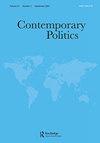Does partisan polarisation predict economic growth? Evidence from 27 European countries
IF 2
3区 社会学
Q1 POLITICAL SCIENCE
引用次数: 0
Abstract
ABSTRACT Several scholars have suggested that political dividedness has harmful effects on economic performance. Interestingly, empirical tests tackling this argument are almost entirely absent. The paper aims to fill this gap by testing the above hypothesis using data from the European Social Survey, including 27 countries between 2002 and 2015. Controlling for a range of well-known explanatory variables, the results of the panel regression analysis suggest that partisan polarisation is adversely related to economic growth, while ideological polarisation is not. The finding is congruent with the hypothesis of polarisation having a notable negative effect on growth, yet future works are necessary to test both the direction and the possible channels of causality. As scholars increasingly describe contemporary politics as an era of growing polarisation, the results imply that partisan polarisation should deserve more attention from political scientists and economists as a factor that might influence economic growth.党派分化能预测经济增长吗?来自27个欧洲国家的证据
一些学者提出,政治分歧对经济表现有有害影响。有趣的是,解决这一论点的实证测试几乎完全缺失。本文旨在通过使用欧洲社会调查(European Social Survey)的数据(包括2002年至2015年间的27个国家)来检验上述假设,从而填补这一空白。控制了一系列众所周知的解释变量,面板回归分析的结果表明,党派极化与经济增长呈负相关,而意识形态极化与经济增长无关。这一发现与两极分化对增长有显著负面影响的假设是一致的,但未来的工作需要测试因果关系的方向和可能的渠道。随着学者们越来越多地将当代政治描述为一个日益两极分化的时代,研究结果表明,党派分化应该作为一个可能影响经济增长的因素,得到政治学家和经济学家更多的关注。
本文章由计算机程序翻译,如有差异,请以英文原文为准。
求助全文
约1分钟内获得全文
求助全文

 求助内容:
求助内容: 应助结果提醒方式:
应助结果提醒方式:


